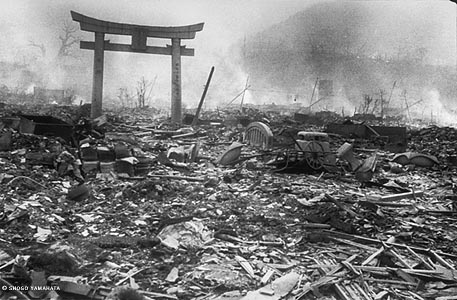This appeared in the March 2008 issue of Wired:
On the morning of October 27, 1969, a squadron of 18 B-52s — massive bombers with eight turbo engines and 185-foot wingspans — began racing from the western US toward the eastern border of the Soviet Union. The pilots flew for 18 hours without rest, hurtling toward their targets at more than 500 miles per hour. Each plane was loaded with nuclear weapons hundreds of times more powerful than the ones that had obliterated Hiroshima and Nagasaki.
The B-52s, known as Stratofortresses, slowed only once, along the coast of Canada near the polar ice cap. Here, KC-135 planes — essentially 707s filled with jet fuel — carefully approached the bombers. They inched into place for a delicate in-flight connection, transferring thousands of gallons from aircraft to aircraft through a long, thin tube. One unfortunate shift in the wind, or twitch of the controls, and a plane filled with up to 150 tons of fuel could crash into a plane filled with nuclear ordnance.
The aircraft were pointed toward Moscow, but the real goal was to change the war in Vietnam. … Frustrated, Nixon decided to try something new: threaten the Soviet Union with a massive nuclear strike and make its leaders think he was crazy enough to go through with it. His hope was that the Soviets would be so frightened of events spinning out of control that they would strong-arm Hanoi, telling the North Vietnamese to start making concessions at the negotiating table or risk losing Soviet military support.
Codenamed Giant Lance, Nixon’s plan was the culmination of a strategy of premeditated madness he had developed with national security adviser Henry Kissinger. The details of this episode remained secret for 35 years and have never been fully told. Now, thanks to documents released through the Freedom of Information Act, it’s clear that Giant Lance was the leading example of what historians came to call the madman theory
: Nixon’s notion that faked, finger-on-the-button rage could bring the Soviets to heel.
… Kissinger had suggested the nuclear maneuvers to give the president more leverage in negotiations. It was an articulation of the game theory he had studied before coming to power. What were [the Soviets] going to do?
Kissinger said dismissively.
— Jeremi Suri, Wired 16.03 (March 2008): The Nukes of October
This is how the State and its exquisitely trained court intellectuals protect you: they steal your money; they use your stolen money to hire armed men who will keep you corralled inside an artificial border; on the basis of their arrogated power over everything inside border, they then throw themselves into ridiculous posturing and pissing contests with other States, over whose artificial borders should go where, over geopolitical prestige and influence, and over politicians’ dreams of a historical legacy; and then, in the name of their own pride, they commission their trained theoretical experts to devise a thermonuclear game of chicken to play for leverage
in the Great Game. It was, after all, only the lives of a few hundreds of millions of ordinary people that were hanging in the balance; not like it was anything important compared to the personal honor of Richard Milhous Nixon, or a negotiated settlement that wouldn’t embarrass the United States federal government in front of all the other governments.
… On the most obvious level, the mission failed. It may have scared the Soviets, but it did not compel them to end their support for Hanoi, and the North Vietnamese certainly didn’t dash to Paris to beg for peace. … More than 35 years after Giant Lance, I asked Kissinger about it during a long lunch at the Four Seasons Grill in New York. Why, I asked, did they risk nuclear war back in October 1969? He paused over his salad, surprised that I knew so much about this episode, and measured his words carefully. Something had to be done,
he explained, to back up threats the US had made and to push the Soviets for help in Vietnam.
No, it didn’t.

